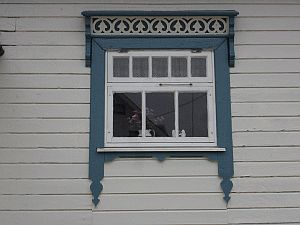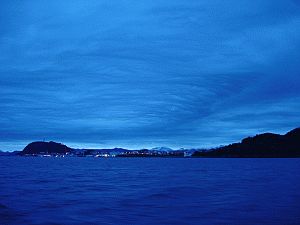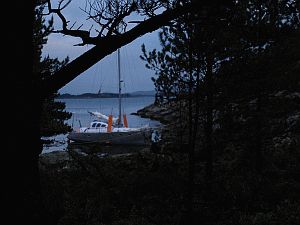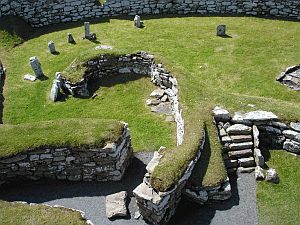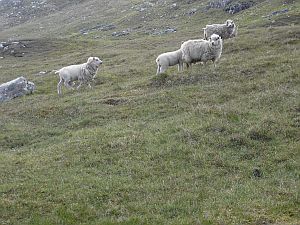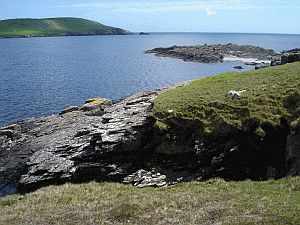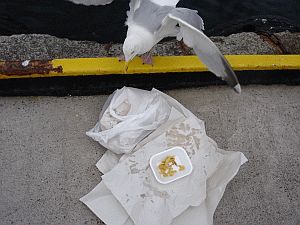
| 13 juin 2005 - Shetland Islands / 60°00'N 1°00'W / TU+1 | |||||||||||||||||||||||||||||||||||
|
Imram quitte Lerwick, la capitale des îles Shetland, une petite ville très active implantée à l'abri d'un port naturel de la côte ouest du Mainland. La Norvège est déjà loin derrière, dans le sillage, au-delà de l'horizon qui se fait à nouveau plus accueillant. Après avoir quitté Kristiansund, la route par la mer nous attend avec vigueur: vent et houle rendent la progression entre cailloux et hautfonds délicate. Tard le soir nous atteignons Björnsund, un village de pêcheurs pittoresque construit sur un archipel de cailloux et d'ilôts reliés par plusieurs digues. L'entrée en suivant l'alignement entre les hauts-fonds sur lesquels se brise la houle avec fracas est impressionnante. Dès que nous arrondissons la passe, le calme revient enfin et les équipiers qui dormaient sortent de leurs cabines. La navigation à l'intérieur du port reste encore délicate en raison des nombreux cailloux à fleur d'eau, heureusement marqués chacun d'un piquet métallique - endroit étonnant! Une fois amarré, les premiers rayons du soleil levant inondent le port et éclairent les maisons aux couleurs vives d'une lumière irréelle: il est 1h du matin!
De retour à bord, nous larguons les amarres pour faire route sur Aalesund, ville qui surprend par son architecture plus typique de l'Europe centrale, en maçonnerie et très uniforme d'un style art nouveau - reconstruit après un incendie dans les années 1920. Nous trouvons un amarrage taillé aux dimensions de notre bateau. Visite de la ville 'by night', nous sommes 2h du matin, une fois de plus totalement décalés.
La mauvaise réputation n'est pas une légende. Un vent du sud souffle en grand frais, par moments en coup de vent et lève une mer forte qui rend la progression inconfortable. Deux longs bord de près au 3ème ris et tourmentin plus une côte cassée lors d'un violent coup de gite, nous ramènent dans des eaux mieux abritées. La visite chez le medecin de Maloy nous rassure - c'est une cassure douloureuse mais heureusement sans autre conséquence. Par prudence nous restons la nuit au port et repartons seulement le lendemain pour la dernière étape vers Florö que nous effectuerons au moteur; un régime humide et tempetueux nous empêche de progresser efficacement à la voile dans les fjords aux aux vents irréguliers qui tombent en fortes rafales des hautes falaises. Le brouillard et la bruine empêchent toute visibilité et nous longeons la côte de près pour nous repérer et nous mettre un peu à l'abri du fort clapot contraire.
Plutôt que de nous mettre à quai de la petite ville industrielle, nous préférons un mouillage façon scandinave (ancre arrière + 2 aussières frappées sur les rochers de la côte) pour y passer la nuit dans une petite anse parfaitement abritée du vent dominant. La manoeuvre est toujours laborieuse mais en vaut la peine. Nous pouvons débarquer à même le rocher (opération toutefois délicate avec une côte cassée) pour nous promener dans les bois environnants, caractéristiques des pays nordiques: dalles de granit couvertes d'épaisses mousses, bruyères, sous-bois promettant une riche récolte de baies sauvages à la fin de l'été... odeurs de tourbe et de quelques moutons, heureux de brouter les herbes sauvages en toute liberté. C'est un lieu magique dont la seule ombre au tableau sont les quantités de déchêts qui jonchent la petite plage... matériaux qui, s'ils ne sont pas nettoyés, prendront des décennies, voir siècles à disparaître! La fin de cette belle étape de 850 milles qui nous aura amené de l'hiver au début du printemps, sera dignement fêtée avec un copieux plat de pâtes aux oignons et tomates-cerises et une bonne bouteille de rouge. Le lendemain matin nous sommes réveillés par la sonnerie du téléphone - Vincent nous attend déjà: il faut admettre que le réseau de téléphonie mobile est très éfficace. Route donc sur Florö, à 2 milles, changement d'équipage: Barbara nous quitte; Vincent embarque. Courses, douches et un dernier plein de gasoil en prévision de la traversée vers les Shetland et c'est parti. Le vent est bon; secteur NW 4-5 Beaufort (>>> lien vers la page http://www.sailworks.net/beaufort/beaufort.htm). Dès que nous quittons l'abri des îles, la houle du large se fait sentir. Nous grimpons et descendons des creux de plusieurs mètres - des conditions 'idéales' pour s'amariner. Quoi qu'il en soit, la météo est parfaite pour traverser et il ne faut pas manquer une fenêtre favorable. Les quarts se suivent et ne se ressemblent pas. A mi-chemin nous traversons les champs de pétrole: de part et d'autre nous apercevons de nombreuses platefomes de forage... et continuons notre route, poussés par une belle brise qui nous permet de glisser à 8 noeuds de moyenne vers notre but.
Au réveil, quelle surprise: nous apercevons "Lady-B" et retrouvons l'équipage que nous avions rencontrés l'année passée à Reykjavik. En fin de journée "Nirvana" et nos amis du Spitzberg entrent au port: parfois le monde est petit! (http://www.synirvana.com/) Les retrouvailles sont chaleureuses et on s'échange les nouvelles, histoires, projets. Pendant ce temps, le ciel est des plus bas, il pleut à l'horizontale, avis de coup de vent - nous attendons l'accalmie. La situation météo semble complexe et difficilement prévisible en raison des nombreuses dépressions qui se déplacent dans des directions les plus exotiques.
Départ à 18h (heure du bord). Le vent est tombé. En ce moment nous faisons route sur un inconfortable résidu de houle du coup de vent de la veille... plus que 28 milles au cap 215° pour amarrer dans le petit port-abri de Fair Isle... on vous racontera la suite de nos aventures parmi macareux, sternes, moutons et cousins des lièvres (!) dans quelques jours. Since a couple of hours Lerwick, the capital of the Shetland islands, is behind us. A busy little place, sitting in a natural harbour behind on the west coast of the main island, sheltered by a small island frorm the ferocious attacks of the North Sea, which saw some rest and recreation for Imram's tired crew. On the other side of the North Sea, Norway is almost a memory by now, lost behind the horizon. After the southward crossing of the Polar Arctic Circle, a couple of day ago, we lived another emotional moment. The Norwegian courtesy flag, which had been flying on Imram's starbord lower shroud for so many days was lowered. Of a sudden, we were reminded of how costant a presence it had been throughout all our past adventures to Jan Mayen, Lofoten and Spitzberg and the visit of the wonderful coastline of this country which has, by now, a special place in our hearts. But, let's go with some order through our recent adventures at
sea and at land. 
Despite the strong wind, we slept through a quiet night, and next morning we explored the lighthouse and the village houses, which, silently, told us old stories of the heydays of the fishing era. The woodwork of many houses was amazing, as were their colours and architecture. Today, many were converted to flashy summer houses, still retaining, in the desert atmosphere of our walk, their charm. We still had quite a few miles to cover in our southbound migration, and the time came to move to Aalesund. We reached this jewel in the crown of the norvegian costal towns in the middle of the night, at 2am local time. It was unreal to motor amidst buildings in the faint lights of penthouse apartments, living rooms, and hotel rooms, into a canal, and moor directly in the middle of the town. Its architecture is surprising, much more typical of central Europe than of these latitudes, with an uniform building style, which originates from the planned reconstruction of the town in Art Nouveau style after it burned down in about 1920. The town was all ours: we strolled its silent streets, and in the twilight of the high-latitudes summer nights we climbed the steps to the hill overlooking the complex structure of fjords and islands in this region: a great view, giving a third dimension to the coastline we had been following in the last hours.
We choose not to spend this last night in this oil town, but rather anchor in a scandinavian way. A laborious operation, with the stern anchor and two mooring lines from the bow, brought ashore and secured to some rocks. It's worthwile. We can climb down from the boat (tricky for the crew member with a broken rib) on a rock which the tide has uncovered and go for a walk through the woods. Slabs of granite covered in moss, birch and pine trees, inhabited by muttons and some cattle. A magic place tainted by the rubbish which litter the small beach where we are moored. Floro, in front, is an industrial town and anything which, for a reason of the other, falls at sea, will eventually find its way on those small islands...which are not cleaned, and will then spend decades, if not centuries, here. We celebrate the end of this leg with spaghetti with spring onions and cherry tomatoes, honouring the spring that is all around us: what a difference with the snowy and wintery Tromso we left 850 miles behind us in this exilarating trip along the norvegian coast. Next day, a phone call from Vincent wakes us up. He's on the jetty in Floro. Time to pick him up, fill the tank with fuel, get the last pepper makarels we learnt to enjoy, say good by to Barbara and start our crossing of the North Sea toward the Shetland Islands. The wind is good, with 4-5Bf from NW. As soon as we are out of the islands, the Atlantic swell appears again. We climb and descend waves of 3-4 meters, "ideal" conditions to get used to the sea... at any rate, those are very favourable conditions for our passage. Hour after hour, watch after watch, the North sea is crossed with the sometimes irreal flames on top of the oil rigs scattered around our way. A reason more to be careful, since some badly-marked, abandoned, rigs might be on our way. Imram is fast, at an average speed of 8 knots Lerwik is soon sighted, after 28 hours to cover 220 miles. The night approach is helped by the lighthouse of the harbours and at midnight board time (UTC) we pass our mooring lines on the cleats of a boat, which is moored to another boat, which is in turn moored to the harbour wall. A few hours later, a fourth boat will moor to our cleats... a busy place.
A small problem to solve: the courtesy flag to hoist on the starbord shroud. After a quick inquiry with some people lining the streets for an evening party, we understand that the UK red ensign is not exactly favoured by the locals, albeit legally correct. The scottish flag we were flying would be welcome but, best, to hoist the so-far-unknown-to-us flag of the Shetland islands, which we would purchase the next morning. Lerwik turned out to be an amazing focal point of our travel: we met "Lady B" which we had met in Reykjavik and "Nirvana" which we had met several times from the Lofoten to the Spitzberg... (http://www.synirvana.com/) clearly enough, those chance encounters were celebrated with enough cappuccino (a new addition to the board menu), beer, wine, wiskey... A nice way to spend our day, since the chaotic metereological situation, with westward (!) moving low pressions, gale winds and horizontal rain do not suggest the start of the next southward passage.
At 6pm board time, after a last small celebrative mooring at the side of the Nirvana, it is time to leave, crossing to Fair Isle, a bird heaven 28 miles in front of us... miles which are more and more unconfortable over the swell which was created by the gale winds of last days... Stay tuned: in a few days you'll know about our visit to this secluded piece of land, ruled by rabbits, puffins and muttons.
Précédent | Index 2005 | Suite/next The
Imram Voyage 2005 - Integral 12.50 - ACAPELA, 2004 |

